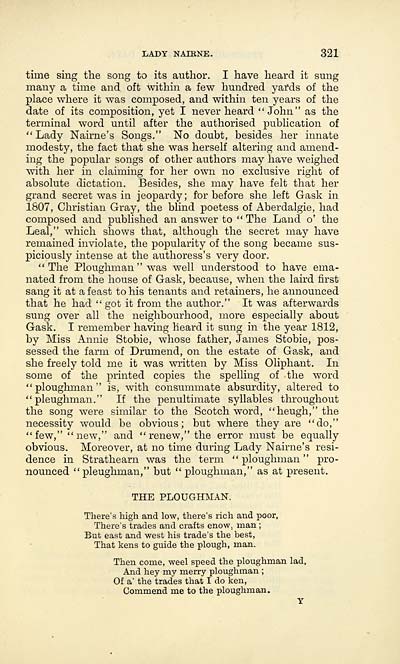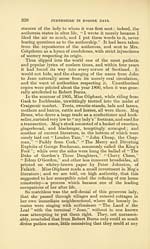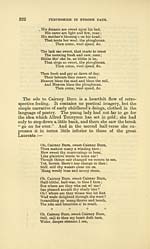Perthshire in bygone days
(349) Page 321
Download files
Complete book:
Individual page:
Thumbnail gallery: Grid view | List view

LADY NAIKNE. 321
time sing the song to its author. I have heard it sung
many a time and oft within a few hundred yafds of the
place where it was composed, and within ten years of the
date of its composition, yet I never heard "John" as the
terminal word until after the authorised publication of
" Lady Nairne's Songs." No doubt, besides her innate
modesty, the fact that she was herself altering and amend-
ing the popular songs of other authors may have weighed
with her in claiming for her own no exclusive right of
absolute dictation. Besides, she may have felt that her
grand secret was in jeopardy; for before she left Gask in
1807, Christian Gray, the blind poetess of Aberdalgie, had
composed and published an answer to " The Land o' the
Leal," which shows that, although the secret may have
remained inviolate, the popularity of the song became sus-
piciously intense at the authoress's very door.
"The Ploughman " was well understood to have ema-
nated from the house of Gask, because, when the laird first
sang it at a feast to his tenants and retainers, he announced
that he had "got it from the author." It was afterwards
sung over all the neighbourhood, more especially about
Gask. I remember having heard it sung in the year 1812,
by Miss Annie Stobie, whose father, James Stobie, pos-
sessed the farm of Drumend, on the estate of Gask, and
she freely told me it was written by Miss Oliphant. In
some of the printed copies the spelling of the word
"ploughman" is, with consummate absurdity, altered to
"pleughman." If the penultimate syllables throughout
the song were similar to the Scotch word, "heugh," the
necessity would be obvious; but where they are "do,"
"few," "new," and "renew," the error must be equally
obvious. Moreover, at no time during Lady Nairne's resi-
dence in Strathearn was the term " ploughman " pro-
nounced "pleughman," but " ploughman," as at present.
THE PLOUGHMAN.
There's high and low, there's rich and poor.
There's trades and crafts enow, man ;
But east and west his trade's the best,
That kens to guide the plough, man.
Then come, weel speed the ploughman lad,
And hey my merry ploughman ;
Of a' the trades that I do ken,
Commend me to the ploughman.
Y
time sing the song to its author. I have heard it sung
many a time and oft within a few hundred yafds of the
place where it was composed, and within ten years of the
date of its composition, yet I never heard "John" as the
terminal word until after the authorised publication of
" Lady Nairne's Songs." No doubt, besides her innate
modesty, the fact that she was herself altering and amend-
ing the popular songs of other authors may have weighed
with her in claiming for her own no exclusive right of
absolute dictation. Besides, she may have felt that her
grand secret was in jeopardy; for before she left Gask in
1807, Christian Gray, the blind poetess of Aberdalgie, had
composed and published an answer to " The Land o' the
Leal," which shows that, although the secret may have
remained inviolate, the popularity of the song became sus-
piciously intense at the authoress's very door.
"The Ploughman " was well understood to have ema-
nated from the house of Gask, because, when the laird first
sang it at a feast to his tenants and retainers, he announced
that he had "got it from the author." It was afterwards
sung over all the neighbourhood, more especially about
Gask. I remember having heard it sung in the year 1812,
by Miss Annie Stobie, whose father, James Stobie, pos-
sessed the farm of Drumend, on the estate of Gask, and
she freely told me it was written by Miss Oliphant. In
some of the printed copies the spelling of the word
"ploughman" is, with consummate absurdity, altered to
"pleughman." If the penultimate syllables throughout
the song were similar to the Scotch word, "heugh," the
necessity would be obvious; but where they are "do,"
"few," "new," and "renew," the error must be equally
obvious. Moreover, at no time during Lady Nairne's resi-
dence in Strathearn was the term " ploughman " pro-
nounced "pleughman," but " ploughman," as at present.
THE PLOUGHMAN.
There's high and low, there's rich and poor.
There's trades and crafts enow, man ;
But east and west his trade's the best,
That kens to guide the plough, man.
Then come, weel speed the ploughman lad,
And hey my merry ploughman ;
Of a' the trades that I do ken,
Commend me to the ploughman.
Y
Set display mode to:
![]() Universal Viewer |
Universal Viewer | ![]() Mirador |
Large image | Transcription
Mirador |
Large image | Transcription
Images and transcriptions on this page, including medium image downloads, may be used under the Creative Commons Attribution 4.0 International Licence unless otherwise stated. ![]()
| Histories of Scottish families > Perthshire in bygone days > (349) Page 321 |
|---|
| Permanent URL | https://digital.nls.uk/94910586 |
|---|
| Description | A selection of almost 400 printed items relating to the history of Scottish families, mostly dating from the 19th and early 20th centuries. Includes memoirs, genealogies and clan histories, with a few produced by emigrant families. The earliest family history goes back to AD 916. |
|---|

